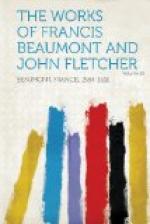was his friends friend, not his vine. His witt
with witt he did not twist To be Assisted, but t’
Assist. And who could succour him, whose quill
Did both Run sense and sense Distill? Had
Time and Art in’t, and the while Slid even
as theirs wh’are only style, Whether his chance
did cast it so Or that it did like Rivers flow
Because it must, or whether twere A smoothnesse
from his file and care, Not the most strict enquiring
nayle Cou’d e’re finde where his piece
did faile Of entyre onenesse; so the frame, Was
Composition, yet the same.
How does he breede his Brother! and
Make wealth and estate understand? Sutes Land to wit, makes Lucke match merit, And makes an Eldest fitly inherit: How was he Ben_, when Ben did write Toth’ stage, not to his judge endite? How did he doe what Johnson did. And Earne what Johnson wou’d have s’ed?
How does he breede his Brother! and
Make wealth and estate understand? Sutes Land to wit, makes Lucke match merit, And makes an Eldest fitly inherit: How was he Ben_, when Ben did write Toth’ stage, not to his judge endite? How did he doe what Johnson did. And Earne what Johnson wou’d have s’ed?
Jos. Howe of Trin. Coll. Oxon.
Master John Fletcher his dramaticall
Workes now at last printed.
I Could prayse Heywood now: or tell how long, Falstaffe from cracking Nuts hath kept the throng: But for a Fletcher, I must take an Age, And scarce invent the Title for one Page. Gods must create new Spheres, that should expresse The sev’rall Accents, Fletcher, of thy Dresse: The Penne of Fates should only write thy Praise: And all Elizium for thee turne to Bayes. Thou feltst no pangs of Poetry, such as they. Who the Heav’ns quarter still before a Play, And search the Ephemerides to finde, When the Aspect for Poets will be kinde. Thy Poems (sacred Spring) did from thee flow, With as much pleasure, as we reads them now. Nor neede we only take them up by fits, When love or Physicke hath diseased our Wits; Or constr’e English to untye a knot. Hid in a line, farre subtler then the Plot. With Thee the Page may close his Ladies eyes, And yet with thee the serious Student Rise: The Eye at sev’rall angles darting rayes, Makes, and then sees, new Colours; so thy Playes To ev’ry understanding still appeare, As if thou only meant’st to take that Eare; The Phrase so terse and free of a just Poise, Where ev’ry word ha’s weight and yet no Noise, The matter too so nobly fit, no lesse Then such as onely could deserve thy Dresse: Witnesse thy Comedies, Pieces of such worth, All Ages shall still like, but ne’re bring forth. Other in season last scarce so long time, As cost the Poet but to make the Rime: Where, if a Lord a new way do’s but spit, Or change his shrugge this antiquates the Wit. That thou didst live before, nothing would tell Posterity, could they but write so well. Thy Cath’lick Fancy will acceptance finde, Not whilst an humours living, but Man-kinde. Thou, like thy Writings, Innocent and Cleane, Ne’re practis’d a new Vice, to make one Scaene, None of thy Inke had gall, and Ladies can, Securely heare thee sport without a Fanne.
But when Thy Tragicke Muse would please to rise




